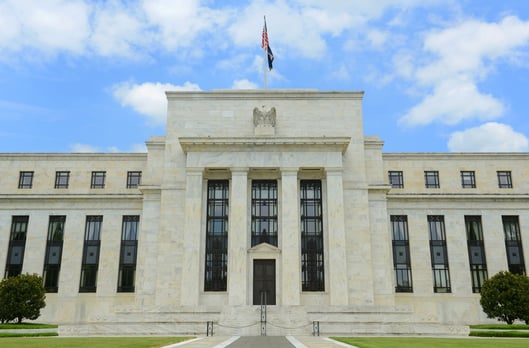
There is a great deal of unease in the United States of America. There seems to be a “feeding frenzy” of the 1% elite Wall Street bankers controlling the economy, setting the rules and “crowding out” the small banks. Objective experts are realizing that the Dodd Frank (Dodd F) Act is good for large banks and bad for small banks, private lenders and consumers.
American Bankerocracy
How did large banks take over America? In 1913, the top Wall Street bankers met with powerful politicians to create the Federal Reserve System. Heretofore, banking had been more localized with power on Main Street, not Wall Street.
The Federal Reserve System concentrated power in the hands of the very few 1% "Too Big Too Fail" (TBTF) banks. "The Creature from Jekyll Island - A Second Look at the Federal Reserve" by G. Edward Griffin listed the following attendees of the 1913 Feder Reserve creation meeting on Jekyll Island:
- Rhode Island Senator Nelson Aldrich (Father-in-law to Rockefellers)
- Assistant Secretary of United States Treasury, Abraham Piatt Andrew
- President of National City Bank of New York, Frank A. Vanderlip
- Senior Partner at J.P. Morgan, Henry P. Davison
- Head of J.P. Morgan, Benjamin Strong
- Kuhn Loeb Partner, Paul M. Warburg (Representing the Rothschilds)
Decision-making was concentrated in the New York Federal Reserve. Gradually, banking decisions became political and were weighed based on whether they would benefit the 1% Wall Street banking cabal.
What do American politicians produce? Nothing. The top six largest banks - J.P Morgan, Goldman Sachs, Morgan Stanley, Citigroup, Bank of America and Wells Fargo - hold assets totaling 63% of U.S. assets circa 2017. These big banks helped fund the Sub-Prime Mortgage Boom before 2008.
What Caused 2008 Sub-Prime Crisis?
In 2008, the large banks and their Congressional henchmen based their loan process on political ways to increase the profits of the 1% TBTF banks. They started by lowering mortgage qualifications to ZERO. They made NINJA loans to those with No Job and No Income.
Robo-signing scandals showed that this was sales driven. The top banks probably offered high commissions based on quantity, not quality. That is what caused the 2008 Sub-Prime Loan Crisis.
The MBS Ponzi scheme was not sustainable?
The large banks re-packaged mortgages to create derivatives, called mortgage-backed securities (MBS). Then, they re-sold these MBS all around the world to individuals, corporations and even governments. The 1% large banks and their politicians made record profits.
When the Ponzi scheme collapsed in 2008, the politicians bailed out their large banking friends and promised the taxpayers tougher regulation with Dodd Frank. Nearly a century after the founding of the Fed, it bailed out its allies with free loans, aka Zero Interest Rate Policy (ZIRP). Large banks get free loans, small banks got over-regulation.
Confusing Congress
Under the concepts of American democracy, the people elect representatives to Congress who will defend their interests. Is that occurring today? Or, are secret societies running the nation?
Many observers are becoming confused by the actions of Congress because they do not reflect the actions of a free democracy. Congress has no right to choose winners and losers in the economy. Capitalism is based on small time bankers making important decisions to spark economic growth.
Dodd-Frank was sold as a consumer protection device. It was a quid pro quo where the banks would be given a bail out in exchange for more regulation. But, if the regulation unfairly punishes small banks (which did nothing wrong), then it is patently unfair.
What did small banks do to cause the 2008 Crisis? Nothing. The TBTF banks set policy and failed. They should be punished. Unfortunately, Dodd Frank applies to all banks. Is that fair? No.
Over-Regulation Favors Large Banks
Over-regulation favors large banks due to economies of scale. These large corporations already have large legal departments, which can ensure compliance. Dodd F has rewarded the failure of the large banks and punished the success of the small banks. How?
Small private mortgage inverstors can offer cheaper loans because they don’t have a large bureaucracy. This is a comparative advantage. They can also offer less paperwork, serving a special group of mortgage seekers.
Private mortgage inverstors provide hard money loans. These are more stable than the TBTF Ponzi scheme. Private mortgage investors lose their comparative advantage, if they must adhere to the same Dodd-Frank paperwork as the large banks.
There is no reason why small banks should be shackled to over-regulatory red tape. Private mortgage investors have done nothing wrong. Unnecessary red tape, such as Dodd Frank, should not apply to small banks. Hard money loans are good for American banking, over-regulation, not so much.
For over 25 years, AMI Lenders has been providing hard money commercial and real estate loans to individuals in the Houston area who otherwise could not get a loan from traditional lenders like banks. Talk to one of our expert loan officers to get your loan application started today.



